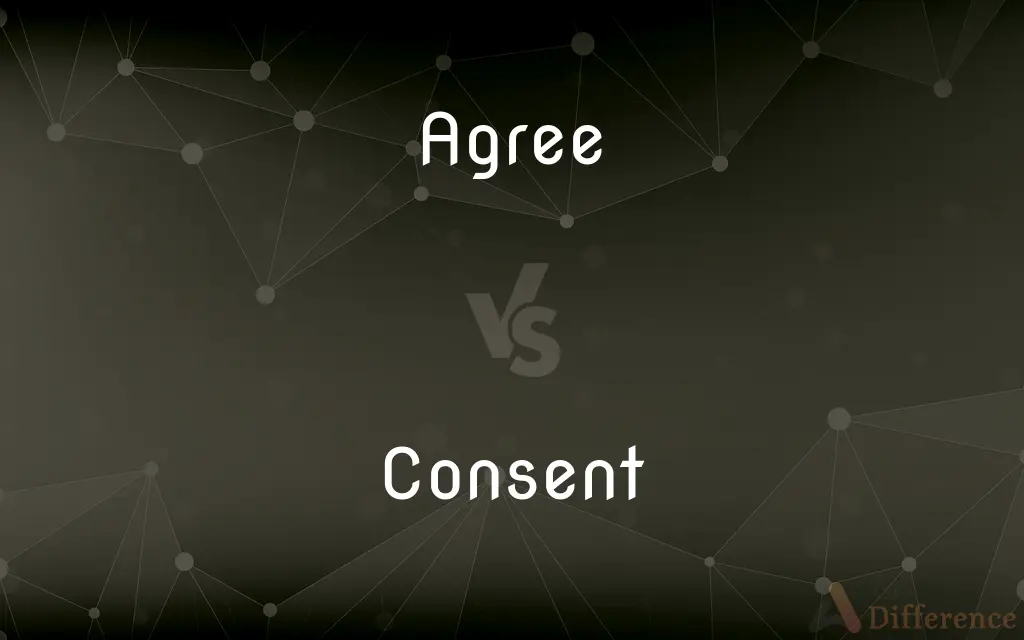Agree vs. Consent — What's the Difference?
Edited by Tayyaba Rehman — By Urooj Arif — Updated on April 22, 2024
"Agree" involves mutual understanding or acceptance among parties, focusing on harmony in opinion or action; "consent" specifically relates to permission or approval, often legally binding.

Difference Between Agree and Consent
Table of Contents
ADVERTISEMENT
Key Differences
"Agree" typically implies a meeting of the minds, where all involved parties share a common viewpoint or decision, often used in informal and formal discussions alike. On the other hand, "consent" is more formal and often used in contexts where legal implications are involved, such as giving consent for medical procedures or data usage.
When individuals "agree" on something, it can be as simple as deciding on a place to eat or accepting a general opinion. Whereas "consent" requires a clear affirmation that someone is willingly permitting something to happen, usually with a full understanding of the consequences.
In many settings, to "agree" might simply mean to not oppose or to go along with a decision without any serious objections. Conversely, "consent" implies a more active and deliberate authorization, often needing to be explicitly stated or documented.
"Agree" can sometimes be inferred from context or behavior, suggesting a more passive form of acceptance. In contrast, "consent" almost always requires explicit and unequivocal communication of approval, reflecting its stronger legal connotations.
In daily interactions, agreements can be informal and understood through general consensus or a nod, while consent often demands a formal process to ensure that all legal and ethical standards are met, especially in professional or medical environments.
ADVERTISEMENT
Comparison Chart
Formality
Can be informal or formal
Usually formal and often documented
Implication
General agreement or harmony
Explicit permission or approval
Usage Context
Social, business, casual discussions
Legal, medical, permissions
Requirement for Expression
Can be verbal or non-verbal, implicit
Must be explicit and clear
Legal Binding
Not necessarily legally binding
Often has legal implications
Compare with Definitions
Agree
To come to a mutual decision, arrangement, or agreement.
The partners agreed on a marketing strategy.
Consent
Formal agreement or approval in a legal context.
The patient gave his consent for the surgery.
Agree
To have the same opinion.
We agree that more funds should be allocated to education.
Consent
Legal or official authorization.
The document was signed with the explicit consent of all parties.
Agree
To correspond; to fit.
The results agree with the findings from earlier studies.
Consent
Agreement in sentiment, opinion, a course of action, etc..
They moved forward with the plans with the full consent of the board.
Agree
To give consent or assent to a condition or proposal.
She agreed to the terms of the contract.
Consent
Permission for something to happen or agreement to do something.
No changes may be made without the consent of all the parties involved.
Agree
To be in accord; be in harmony.
All members agree on the need for reforms.
Consent
Acquiescence or compliance with the decisions of another.
She acted with her parent's consent.
Agree
To share an opinion or feeling; be in accord
I agree with you on that. We agree in our taste in music.
Consent
Permission for something to happen or agreement to do something
No change may be made without the consent of all the partners
Agree
To express consent; concur
We agreed to her suggestion.
Consent
Give permission for something to happen
He consented to a search by a detective
Agree
To accept or support a policy or program
I agree with the flat tax.
Consent
To give assent, as to the proposal of another; agree
Consent to medical treatment.
Consent to going on a business trip.
Consent to see someone on short notice.
Agree
To come to an understanding or agreement, as by negotiating
We agreed on the price.
Consent
(Archaic) To be of the same mind or opinion.
Agree
To be compatible or consistent
The copy agrees with the original. Your story agrees with mine.
Consent
Acceptance or approval of what is planned or done by another; acquiescence.
Agree
To be suitable, appropriate, pleasing, or healthful
Spicy food does not agree with me.
Consent
Agreement as to opinion or a course of action
She was chosen by common consent to speak for the group.
Agree
(Grammar) To correspond in gender, number, case, or person.
Consent
(intransitive) To express willingness, to give permission.
After reflecting a little bit, I've decided to consent.
Agree
To share an opinion about (something)
My doctor and I agree that I should quit smoking.
Consent
To cause to sign a consent form.
Agree
To grant or concede
My parents agreed that we should be allowed to go. I agreed to help my parents clean the house.
Consent
To grant; to allow; to assent to.
Agree
(intransitive) To be in harmony about an opinion, statement, or action; to have a consistent idea between two or more people.
All parties agree in the expediency of the law.
I mostly agree with what you said, but I consider your last point to be unfair.
I couldn't agree more with what you say.
Consent
To agree in opinion or sentiment; to be of the same mind; to accord; to concur.
Agree
To give assent; to accede
To agree to an offer, or to opinion.
The workers didn not agree to the new terms offered by the trade union.
Consent
Voluntary agreement or permission.
Agree
To yield assent to; to approve.
Consent
(obsolete) Unity or agreement of opinion, sentiment, or inclination.
Agree
(intransitive) To make a stipulation by way of settling differences or determining a price; to exchange promises; to come to terms or to a common resolve; to promise.
Consent
(obsolete) Advice; counsel.
Agree
(intransitive) To resemble; to coincide; to correspond.
The picture does not agree with the original; the two scales agree exactly.
Consent
To indicate or express a willingness; to yield to guidance, persuasion, or necessity; to give assent or approval; to comply.
My poverty, but not my will, consents.
And whispering "I will ne'er consent," - consented.
Agree
To suit or be adapted in its effects; to do well.
The same food does not agree with every constitution.
Consent
To grant; to allow; to assent to; to admit.
Interpreters . . . will not consent it to be a true story.
Agree
To correspond to (another word) in a grammatical category, such as gender, number, case, or person.
In Romanian, all articles, adjectives, and pronouns agree in gender, number and case with the noun they refer to.
Consent
Agreement in opinion or sentiment; the being of one mind; accord.
All with one consent began to make excuse.
They fell together all, as by consent.
Agree
To consent to a contract or to an element of a contract.
Consent
Correspondence in parts, qualities, or operations; agreement; harmony; coherence.
The melodious consent of the birds.
Such is the world's great harmony that springsFrom union, order, full consent of things.
Agree
To harmonize in opinion, statement, or action; to be in unison or concord; to be or become united or consistent; to concur; as, all parties agree in the expediency of the law.
If music and sweet poetry agree.
Their witness agreed not together.
The more you agree together, the less hurt can your enemies do you.
Consent
Voluntary accordance with, or concurrence in, what is done or proposed by another; acquiescence; compliance; approval; permission.
Thou wert possessed of David's throneBy free consent of all.
Agree
To yield assent; to accede; - followed by to; as, to agree to an offer, or to opinion.
Consent
Capable, deliberate, and voluntary assent or agreement to, or concurrence in, some act or purpose, implying physical and mental power and free action.
Agree
To make a stipulation by way of settling differences or determining a price; to exchange promises; to come to terms or to a common resolve; to promise.
Agree with thine adversary quickly.
Didst not thou agree with me for a penny ?
Consent
Sympathy. See Sympathy, 4.
Agree
To be conformable; to resemble; to coincide; to correspond; as, the picture does not agree with the original; the two scales agree exactly.
Consent
Permission to do something;
He indicated his consent
Agree
To suit or be adapted in its effects; to do well; as, the same food does not agree with every constitution.
Consent
Give an affirmative reply to; respond favorably to;
I cannot accept your invitation
I go for this resolution
Agree
To correspond in gender, number, case, or person.
Agree
To make harmonious; to reconcile or make friends.
Agree
To admit, or come to one mind concerning; to settle; to arrange; as, to agree the fact; to agree differences.
Agree
Be in accord; be in agreement;
We agreed on the terms of the settlement
I can't agree with you!
I hold with those who say life is sacred
Both philosophers concord on this point
Agree
Consent or assent to a condition, or agree to do something;
She agreed to all my conditions
He agreed to leave her alone
Agree
Go together;
The colors don't harmonize
Their ideas concorded
Agree
Show grammatical agreement;
Subjects and verbs must always agree in English
Agree
Be agreeable or suitable;
White wine doesn't agree with me
Agree
Achieve harmony of opinion, feeling, or purpose;
No two of my colleagues would agree on whom to elect chairman
Common Curiosities
Can one agree without giving consent?
Yes, one can agree informally without the need for explicit consent.
How is consent expressed legally?
Legally, consent must be explicit, clear, and often documented.
What does it mean to agree?
Agreeing means sharing the same view or decision with others.
Does agreement imply understanding?
Yes, agreement generally implies a level of understanding among the parties involved.
What is the difference between agreeing and consenting in a medical context?
Agreeing in a medical context might refer to accepting a doctor's advice, whereas consenting involves formally allowing a procedure.
How are disagreements resolved when people agree in principle but not on details?
Such disagreements are often resolved through negotiation or mediation.
Can children consent?
Typically, children cannot give legal consent; a guardian does so on their behalf.
Is agreement binding?
An agreement may not necessarily be legally binding unless it forms part of a contract.
What does "without consent" imply?
It implies actions taken without approval or authorization, often illegal or unethical.
Is consent always needed in legal matters?
Yes, consent is often required in legal settings to ensure compliance with laws.
Why is consent important?
Consent is crucial for maintaining individual rights and ensuring ethical standards are met.
Can you withdraw consent?
Yes, consent can typically be withdrawn unless legally bound otherwise.
What forms can consent take?
Consent can be verbal, written, or implied by actions, though legal contexts usually require formal documentation.
Are agreements always fair?
Not necessarily; agreements can be unfair especially if all parties are not equally informed.
Is implied consent valid?
Implied consent is valid in some contexts but may not hold in situations requiring explicit authorization.
Share Your Discovery

Previous Comparison
Customer vs. Consumer
Next Comparison
Signaling vs. SignallingAuthor Spotlight
Written by
Urooj ArifUrooj is a skilled content writer at Ask Difference, known for her exceptional ability to simplify complex topics into engaging and informative content. With a passion for research and a flair for clear, concise writing, she consistently delivers articles that resonate with our diverse audience.
Edited by
Tayyaba RehmanTayyaba Rehman is a distinguished writer, currently serving as a primary contributor to askdifference.com. As a researcher in semantics and etymology, Tayyaba's passion for the complexity of languages and their distinctions has found a perfect home on the platform. Tayyaba delves into the intricacies of language, distinguishing between commonly confused words and phrases, thereby providing clarity for readers worldwide.
















































